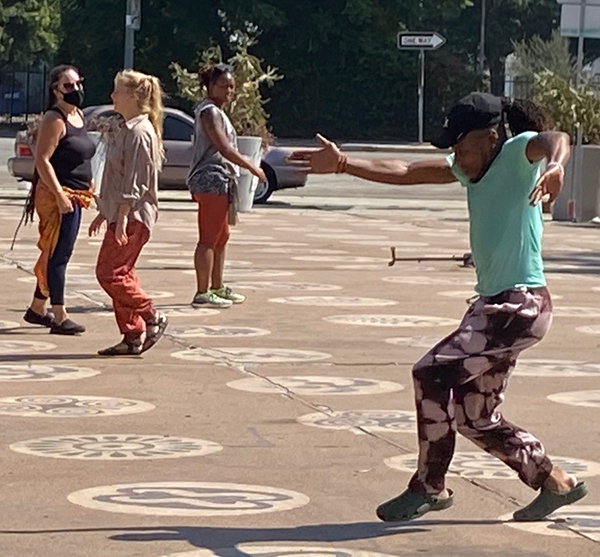By Darlene Donloe
Contributing Writer
LEIMERT PARK — On any given Saturday at 11 a.m., the sounds of African drums can be heard permeating the streets of Leimert Park while dozens of students dressed in all manner of colorful garb, stomp, kick, twist and jump their way through Daunté “Kingtae” Fyall’s African dance class.
Two months into the pandemic after he decided to hold “socially distanced” dance classes outdoors, Fyall, 33, the founder of Daansekou Arts Collective, began the “West African Dance Fundamentals with Kingtae” class in Leimert Plaza, in the heart of Leimert Park.
“We were the first African dance class to come outside,” said Fyall, a Washington, D.C. native. “I started the class in Leimert Park because it’s a great location and we knew no one would bother us playing drums. Leimert Park welcomed the drums of healing and transformation. A month or two into the pandemic and we decided to go outside where I can teach technique and energy. We needed to connect with the drums.”
The drumming is led by master drummer Pape Diouf who has been teaching West African drumming in Los Angeles for more than 15 years. Every Sunday, he leads an outdoor class in Leimert Park.
“These drums have made it through several world events and the Atlantic slave trade,” said Fyall, who attended Coppin State University in Baltimore. “As long as we stay close to those drums, we will also get through. This is our medicine, our healing. Going through this pandemic, we need these drums now as medicine.”
Fyall believes there is “power attached to these drums.”
“The more people I can give the medicine to, the better,” he said. “It’s important to make it through these times. We need it. We are healing people. I have folks who drive up from San Diego, the Inland Empire, and from all over. Someone comes twice a month who lives in Arizona. She comes to get her fix.”
Literally held in the street at the intersection of 43rd Place and Degnan Boulevard, Fyall’s class, which is open to all levels and all ages, is a celebration of West African culture through dance and live drumming by West African traditional master drummers from Guinea and Senegal. The experience has also become a drum class for anyone who wants to learn traditional rhythms.
Classes are filled with men, women and children. They come, they say, because there “isn’t anything like it.”
“I came because I initially wanted to lose weight,” said a participant who wanted to remain anonymous. “There is nothing like this in the area of the city where I live. It’s good fun and great exercise. Plus, if you don’t have the $15, it’s ‘pay what you can.’”
“If you can’t donate, just give me a hug,” Fyall said. “My specialized dance class has a price, but community classes are donation-based. Some people say they can’t come because they can’t find a babysitter. I tell them to bring the baby and they can both participate.
“There isn’t a price tag you can put on what African culture is worth. People shouldn’t be turned away from African culture because they don’t have $15.”
Fyall began his dance career at age 19 with the KanKouran West African Dance Company in Maryland.
“I was that kid that would turn the weddings out,” he said. “I was always dancing. I had no formal training until I got to KanKouran. That inspired me to take modern dance courses in college.
“I also started classically dancing at Debbie Allen’s Dance Academy on a scholarship. I formerly learned ballet, tap, flamenco, Dunham and jazz.”
Fyall, who recently became a father, said dance is a “huge” part of his life.
“It’s my emotional outlet,” he said. “With dance, I’m able to release and feel that completion. There’s no weight on my shoulders. When I dance, I feel like I am healing from past emotional trauma. The best way to get to know me is to see me dance and move about in that realm.”
Fyall prides himself on the fact that his class is a “judgment-free space.”
“It’s a beautiful thing,” he said. “There are no day cares in Africa. The village raises the child. We are doing the same thing. We are using the power of our ancestors. This is our village circle. We call ourselves The Love Tribe. Every class is like a family reunion.”
Darlene Donloe is a freelance reporter for Wave Newspapers who covers South Los Angeles. She can be reached at ddonloe@gmail.com.











